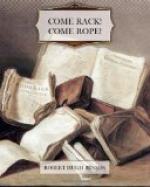“How dare you say I am not a Catholic, sir!”
“A Catholic, sir, to my mind,” said Robin steadily, “is one who holds to the Catholic Church and to no other. I mean nothing offensive, sir; I mean what I said I meant, and no more. It is not for me to condemn—”
“I should think not!” snorted the old man.
“Well, sir, that is my reason. And further—”
He stopped, doubtful.
“Well, sir—what further?”
“Well, I cannot come to the church with you at Easter.”
His father wheeled round savagely in his chair.
“Father, hear me out, and then say what you will.... I say I cannot come with you to church at Easter, because I am a Catholic. But I do not wish to trouble or disobey you openly. I will go away from home for that time. Good Mr. Barton will cause no trouble; he wants nothing but peace. Father, you are not just to me. You have taught me too much, or you have not given me time enough—”
Again he broke off, knowing that he had said what he did not mean, but the old man was on him like a hawk.
“Not time enough, you say? Well, then—”
“No, sir; I did not mean that,” wailed Robin suddenly. “I do not mean that I should change if I had a hundred years; I am sure I shall not. But—”
“You said, ‘Not time enough,’” said the other meditatively. “Perhaps if I give you time—”
“Father, I beg of you to forget what I said; I did not mean to say it. It is not true. But Marjorie said—”
“Marjorie! What has Marjorie to do with it?”
Robin found himself suddenly in deep waters. He had plunged and found that he could not swim. This was the second mistake he had made in saying what he did not mean.... Again the courage of despair came to him, and he struck out further.
“I must tell you of that too, sir,” he said. “Mistress Marjorie and I—”
He stopped, overwhelmed with shame. His father turned full round and stared at him.
“Go on, sir.”
Robin seized his glass and emptied it.
“Well, sir. Mistress Marjorie and I love one another. We are but boy and girl, sir; we know that—”
Then his father laughed. It was laughter that was at once hearty and bitter; and, with it, came the closing of the open door in the boy’s heart. As there came out, after it, sentence after sentence of scorn and contempt, the bolts, so to say, were shot and the key turned. It might all have been otherwise if the elder man had been kind, or if he had been sad or disappointed, or even if he had been merely angry; but the soreness and misery in the old man’s heart—misery at his own acts and words, and at the outrage he was doing to his own conscience—turned his judgment bitter, and with that bitterness his son’s heart shut tight against him.




